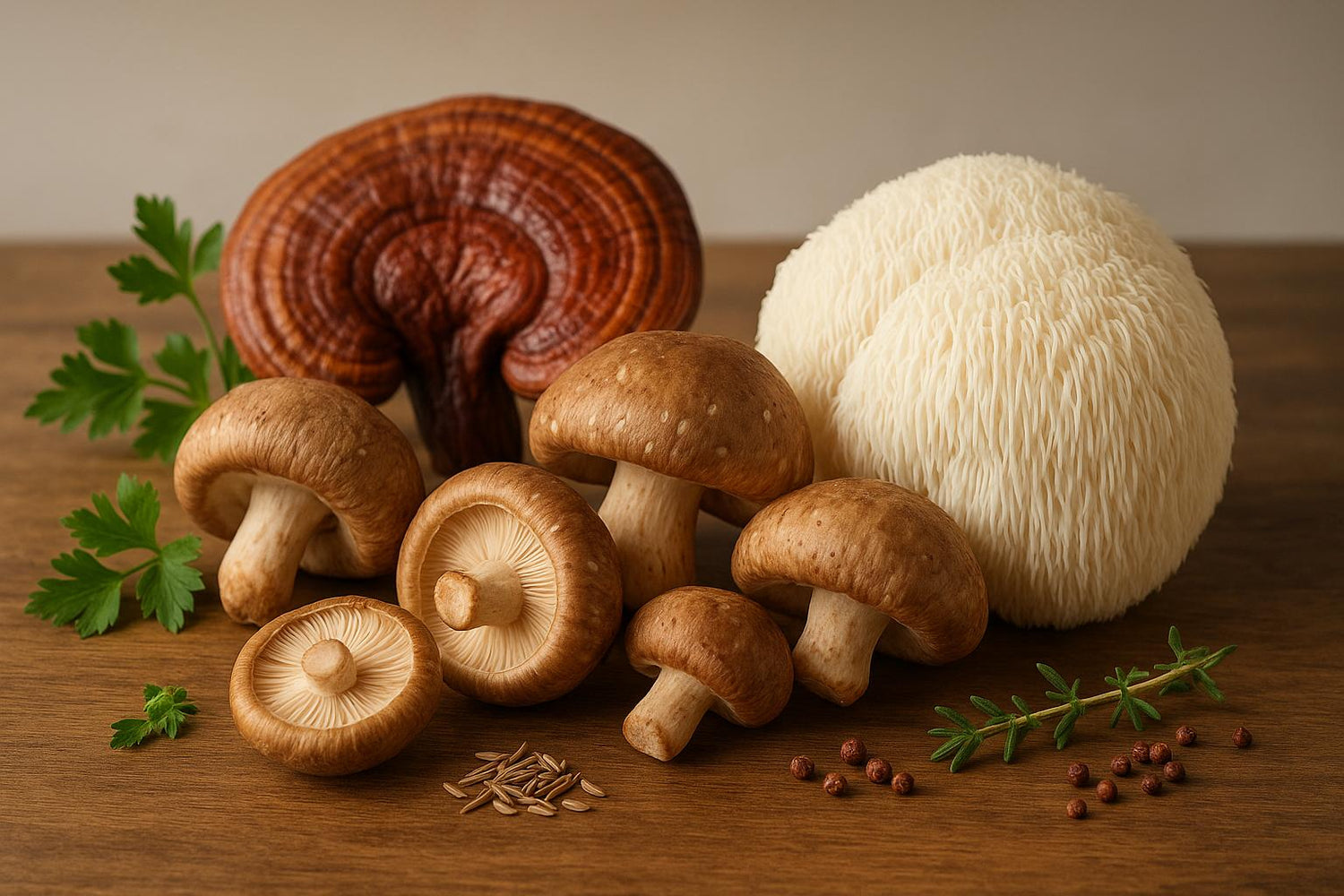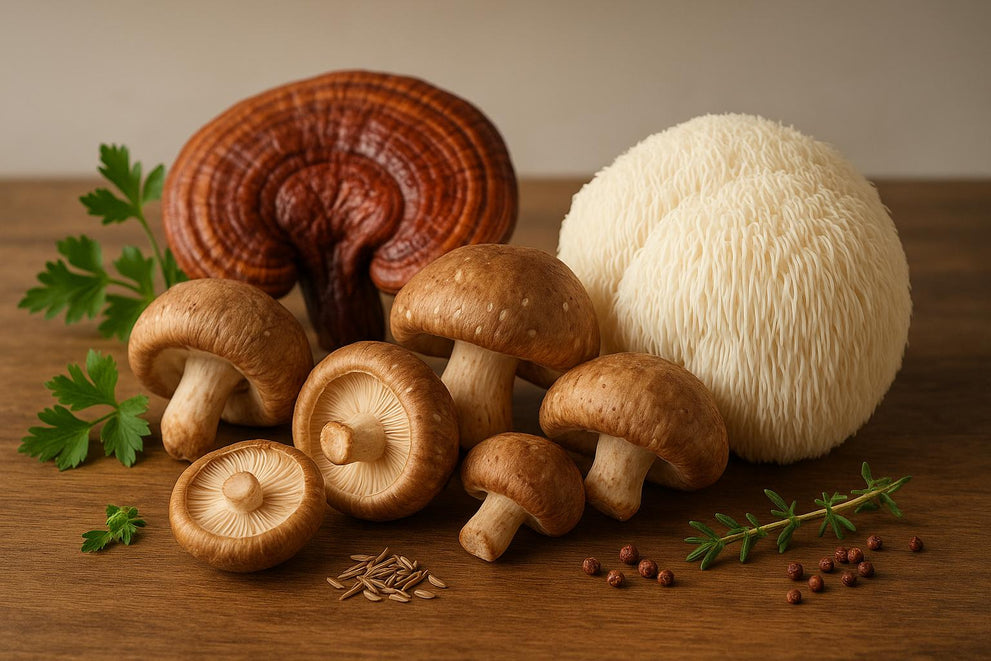Functional mushrooms show promise in managing chronic inflammation, a condition linked to diseases like diabetes, heart issues, and cancer. Research highlights their bioactive compounds - like beta-glucans, ergothioneine, and fungal immunomodulatory proteins (FIPs) - which help regulate the immune system and reduce inflammation. Key findings include:
- Beta-glucans: Found in species like oyster mushrooms, these compounds reduce pro-inflammatory markers and mimic effects similar to NSAIDs.
- Ergothioneine: An antioxidant that repairs tissue damage and reduces inflammatory cytokines.
- FIPs: Proteins that balance pro- and anti-inflammatory markers, supporting metabolic and immune health.
Recent studies demonstrate mushrooms' effectiveness in both lab and human trials. For instance, lion's mane has been shown to alleviate neuroinflammation and support gut health, while chaga reduces systemic inflammation in a dose-dependent manner. Products like mushroom gummies are becoming a popular way to incorporate these benefits into daily routines, offering a convenient and palatable option for natural inflammation management.
To get started, focus on high-quality products made from fruiting body extracts, and consult a healthcare provider to ensure safe and effective use.
The SECRET Health Benefits of the Lions Mane Mushroom! | GroCycle

Key Bioactive Compounds in Mushrooms
Functional mushrooms are packed with compounds like beta-glucans, ergothioneine, and fungal immunomodulatory proteins (FIPs), which play a role in supporting the immune system and managing chronic inflammation. Let’s dive into how these key components work.
Polysaccharides and Beta-Glucans
Beta-glucans are some of the most researched anti-inflammatory agents found in mushrooms. These complex carbohydrates act as biological response modifiers, boosting immune function and helping control inflammation. Their effectiveness depends on the mushroom species and growing conditions, which can affect the beta-glucan content.
Beta-glucans work by inhibiting enzymes like cyclooxygenase-2 and nitric oxide synthase, while also suppressing pro-inflammatory cytokines such as interleukin 1β. In animal studies, their effects have been compared to those of NSAIDs. They bind to receptors on immune cells, such as dectin-1 and toll-like receptors (TLRs), prompting immune responses like phagocytosis and cytokine production.
Certain mushrooms stand out for their robust beta-glucan profiles. For example, Pleurotus ostreatus (oyster mushroom) is known for its high beta-glucan content, while species like Agaricus blazei and Lactarius rufus have also shown anti-inflammatory properties. This highlights the important role beta-glucans play in combating chronic inflammation.
Ergothioneine: A Natural Antioxidant
Ergothioneine (EGT) is another standout compound in mushrooms, prized for its antioxidant properties. It accumulates in areas of tissue damage, activates repair pathways like the MAPK cascade, and regulates inflammatory cytokines such as TNF-α, NF-κB, and IL-6. This dual action helps neutralize free radicals while reducing inflammation.
Research shows that EGT can block the activation of NF-κB caused by hydrogen peroxide (H₂O₂) and TNF-α, preventing the release of pro-inflammatory cytokines like interleukin 8 (IL-8). Studies on mice lacking the ergothioneine transporter reveal a higher vulnerability to inflammation, especially after events like ischemia-reperfusion injury. Additionally, EGT inhibits JNK-mediated IL-6 production and TNF-α–triggered IL-8 release, making it a promising tool for managing chronic inflammatory conditions.
Fungal Immunomodulatory Proteins (FIPs)
FIPs are another group of compounds that highlight the anti-inflammatory potential of mushrooms. These proteins, including polysaccharide-K (PSK), help balance cytokine levels by reducing pro-inflammatory markers like IFN-γ, IL-6, and IL-1β, while increasing anti-inflammatory cytokines such as IL-10. This balance improves inflammation and metabolic health in animal studies.
Mushrooms also contain terpenoids, which further support the immune system and provide both anti-inflammatory and antioxidant effects. Ganoderma lucidum (reishi) is particularly rich in these compounds, with over 100 types of triterpenes identified - 50 of which are exclusive to this species.
The combined action of these compounds explains why whole mushroom extracts often deliver stronger anti-inflammatory benefits compared to isolated ingredients. This synergy makes functional mushrooms an excellent choice for natural inflammation management and overall wellness.
Recent Scientific Studies on Anti-Inflammatory Effects
Recent research has shown that functional mushrooms can help reduce inflammation by targeting specific markers, as demonstrated in both laboratory and human studies. These effects are attributed to the bioactive compounds found in mushrooms, which have been the focus of various scientific investigations.
Lab and Animal Study Results
Laboratory studies have highlighted the anti-inflammatory potential of different mushroom species, with lion's mane mushroom (Hericium erinaceus) standing out for its impressive results.
For instance, in experiments using RAW 264.7 macrophages, polysaccharides and phenolic compounds from H. erinaceus were found to significantly lower the production of key inflammatory markers like TNF-α, IL-6, and nitric oxide when exposed to lipopolysaccharide (LPS) stimuli. This indicates that lion's mane compounds can directly interfere with inflammation at the cellular level.
Further studies on brain cells have shown that lion's mane offers neuroprotective benefits. Research led by Lee et al. demonstrated that erinacine A, a compound found in lion's mane, reduced pro-inflammatory cytokine production in BV-2 microglial cells, suggesting its ability to combat brain inflammation.
Animal studies have reinforced these findings. In a mouse model of Alzheimer's disease, erinacines from lion's mane reduced neuroinflammation and suppressed the expression of IL-1β, hinting at potential benefits for brain health and cognitive aging. Similarly, studies on digestive health revealed that H. erinaceus polysaccharides helped alleviate colitis in mice induced by dextran sulfate sodium (DSS). This was achieved by restoring gut microbiota balance and lowering pro-inflammatory cytokines. The dual action of supporting gut health while reducing inflammation showcases the sophisticated mechanisms at work.
Metabolic health studies have also drawn attention to lion's mane. In mice fed a high-fat diet, supplementation with H. erinaceus extracts reduced systemic inflammation and improved insulin sensitivity, linking mushroom consumption to better metabolic outcomes.
Another mushroom, chaga, has shown dose-dependent anti-inflammatory effects. Its extracts reduced the production of pro-inflammatory markers, including IL-6 and TNF-α, with higher doses yielding more pronounced effects. These findings suggest that dosage plays a critical role in maximizing the benefits of mushroom-based interventions.
While these controlled experiments provide valuable insights, human trials add a layer of real-world relevance to these findings.
Human Studies and Dietary Research
Human clinical trials offer the most practical evidence for understanding how mushrooms can combat inflammation. Notably, many of these studies have examined the effects of mushroom extract blends rather than individual species.
In 2009, Johnson et al. conducted a phase I clinical trial involving 15 healthy individuals who consumed 60 mL of an aqueous mushroom extract called AndoSan daily for 12 days. This mixture, made up of 82% A. blazei mycelium, 15% Hericium erinaceum, and 3% Grifola frondosa, led to a significant reduction in pro-inflammatory cytokines, including IL-1β, TNF-α, IL-6, IL-2, and IL-7, while leaving other cytokines unaffected.
Building on these results, a follow-up study in 2011 focused on 21 hospitalized patients with inflammatory bowel diseases like ulcerative colitis and Crohn's disease. Using the same AndoSan protocol, researchers observed a notable decrease in plasma levels of pro-inflammatory cytokines. Additionally, patients with ulcerative colitis experienced a reduction in fecal calprotectin, an inflammatory marker. These outcomes suggest that a daily dose of 60 mL for 12 days could be an effective treatment strategy.
The anti-inflammatory effects of mushrooms are linked to their diverse bioactive components, such as polysaccharides, phenolic and indolic compounds, mycosteroids, fatty acids, carotenoids, vitamins, and biometals. These compounds likely work together to amplify their therapeutic effects, offering more benefits than isolated ingredients could achieve.
Altogether, the evidence underscores the potential of mushrooms as a natural tool for managing inflammation. While traditional wellness practices have long embraced mushrooms, modern science is now validating their role in anti-inflammatory protocols. Researchers agree that more clinical studies are needed to better understand the full range of their benefits and ensure their safety when used in complex human systems.
These findings bridge ancient traditions with modern health research, making mushrooms a promising addition to inflammation management strategies. Their ability to combine precision from lab studies with real-world benefits seen in human trials makes them a compelling option for natural wellness.
sbb-itb-0d19bd1
Mushroom Products and Consumer Applications
The growing body of research on mushrooms' anti-inflammatory properties has paved the way for innovative consumer products. These findings are now shaping product designs that aim to harness the health benefits of mushrooms in everyday life. One standout example of this trend is the popularity of mushroom gummies, which seamlessly integrate functional mushrooms into daily routines.
Mushroom Gummies and Functional Products
Mushroom gummies offer a convenient way to ensure consistent intake of beneficial compounds. Unlike capsules or powders, which often have a strong earthy taste, gummies provide a more appealing and flavorful alternative.
"Medicinal, non-psychoactive mushrooms like reishi, lion's mane, cordyceps and chaga are believed to offer unique health benefits depending on the type of mushroom." – Karen D. Sullivan, PhD, ABPP, Neuropsychologist
Gummies not only make supplementation more enjoyable but also enhance dosage precision and absorption. The pectin used in gummies can improve how the body absorbs these bioactive compounds, ensuring a steady intake of their benefits. Many products combine multiple mushroom species to amplify their health-supporting and anti-inflammatory effects.
Scientific studies back the effectiveness of mushroom-based supplements. For instance, one study found that individuals aged 50 and older with mild Alzheimer's symptoms experienced significant cognitive improvements after taking three 350-mg lion's mane capsules daily for 49 weeks. Another study reported reduced depression, anxiety, and sleep issues in 77 overweight participants who took three 400-mg capsules daily for 8 weeks.
However, not all mushroom products are created equal. Market analysis reveals notable differences in the composition, potency, and quality of commercially available options. Claims about antioxidant and anti-inflammatory properties on product labels are often not supported by rigorous studies.
"When it comes to all supplements, it's important to be a critical consumer, paying attention to both the quality and bioavailability of the product." – Karen D. Sullivan, PhD, ABPP, Neuropsychologist
Experts suggest starting with a low dose of mushroom gummies and gradually increasing it to find what works best for your body. Opting for products made from 100% fruiting body extracts and avoiding added sugars or artificial ingredients is also recommended. Additionally, trying whole mushrooms individually before combining them in a gummy may help you better understand your body's response.
How Diet Smoke Uses Mushrooms

Diet Smoke has embraced the health potential of mushrooms by creating products designed to address specific wellness needs. Their formulations are based on scientific research, ensuring that each product delivers targeted benefits. A prime example is their Evening Calm Gummies, which combine functional mushrooms with other soothing ingredients.
Each Evening Calm gummy contains 200 mg of reishi and 200 mg of chaga - mushrooms known for their anti-inflammatory and stress-relieving effects - along with 2 mg of THC, 20 mg of chamomile, 10 mg of valerian root, and 2 mg of melatonin.
"Evening Calm Gummies are expertly crafted to help you unwind and enjoy a peaceful, restful sleep. Each gummy contains 2mg of THC, offering a gentle and soothing relaxation experience that helps ease your body and mind into a tranquil state, perfect for a good night's rest." – Diet Smoke
Diet Smoke prioritizes quality by conducting rigorous lab testing to ensure purity and consistency. Their products are vegan, dairy-free, and gluten-free, catering to consumers seeking clean and accessible options.
The Evening Calm Gummies have earned a 4.9 out of 5 stars rating from 93 reviews and are priced at $38.00 for a pack of 20 gummies. For first-time users, the brand advises starting with one gummy and waiting 30–60 minutes to gauge its effects, allowing for a gradual adjustment to find the ideal dosage.
Beyond the Evening Calm line, Diet Smoke offers a range of mushroom gummies designed for various wellness goals, including sleep, energy, focus, and mood. This approach reflects an understanding of how different mushroom compounds interact with the body. By integrating mushrooms into cannabis products, Diet Smoke exemplifies a growing trend of blending traditional plant-based remedies with modern, convenient formats. Their discreet packaging and risk-free purchasing options make it easier for consumers to explore these natural anti-inflammatory solutions.
Conclusion: Mushrooms as Natural Anti-Inflammatory Support
Functional mushrooms provide a natural way to help manage inflammation, backed by impressive research. For instance, mushrooms like Ganoderma lucidum have been found to contain around 400 bioactive compounds, many of which play a role in reducing inflammation by targeting key pathways and lowering pro-inflammatory cytokines. This unique ability to work at a molecular level opens the door for practical, consumer-friendly applications.
Safety is another standout feature of functional mushrooms. Unlike non-steroidal anti-inflammatory drugs (NSAIDs), which often come with serious side effects when used long-term, mushrooms have been safely used in traditional medicine for thousands of years. With about 600 species known for their medicinal properties out of an estimated 14,000, there’s no shortage of options for researchers and consumers to explore.
Scientific studies highlight how mushroom extracts can reduce the activity of genes responsible for producing inflammatory mediators. These findings have inspired the development of innovative products like Diet Smoke's mushroom gummies, which aim to deliver targeted anti-inflammatory benefits based on solid research.
"While I don't promote foods made with functional mushrooms as cure-alls, less-processed or refined products can be a part of a healthy lifestyle. The dietary choices that we make on a daily basis have a compounded effect. The positive changes we make, big or small, add up over time." – Akua Woolbright, Ph.D. in nutritional science and formerly the national nutrition program director for Whole Foods Market's Whole Cities Foundation
The growing popularity of functional mushrooms is reflected in the industry's projected growth to nearly $45 billion by 2028, signaling increasing consumer trust in these natural solutions.
To get started, experts recommend selecting high-quality products and introducing one type of mushroom at a time to gauge your body’s response. Consulting with a healthcare provider before trying any new supplement is also a wise step. With proper use, these fungi offer a promising, natural way to manage inflammation.
As research continues to uncover how mushrooms work to combat inflammation, they represent a fascinating blend of ancient knowledge and modern science. From their molecular mechanisms to innovative consumer products, functional mushrooms are proving to be a valuable ally in supporting long-term health and wellness.
FAQs
How do mushrooms help reduce inflammation in the body?
Mushrooms are packed with bioactive compounds that play a role in fighting inflammation by addressing key processes within the body. Compounds like polysaccharides, terpenoids, and phenolic compounds help regulate inflammatory pathways. For instance, they can inhibit NF-kB signaling and decrease oxidative stress, which together work to lower the production of pro-inflammatory cytokines and other inflammation-triggering mediators.
By managing oxidative stress and helping to balance the immune system, mushrooms may provide relief from chronic inflammation - a factor often tied to numerous health issues. These natural anti-inflammatory benefits make mushrooms a great addition to any wellness-focused routine.
What are the possible side effects or risks of using mushroom supplements to manage inflammation?
Mushroom-based supplements are widely regarded as safe for most people, but they can occasionally cause side effects. Common issues might include nausea, stomach discomfort, dizziness, dry mouth, or skin irritation, particularly if consumed in high doses or over extended periods. For those with mushroom sensitivities, allergic reactions are also a possibility.
Some mushrooms, like reishi, may pose additional risks for individuals with bleeding disorders or those preparing for surgery, as they can potentially increase bleeding tendencies. To reduce these risks, it’s crucial to stick to recommended dosages and consult with a healthcare professional before introducing mushroom supplements into your routine - especially if you have pre-existing health conditions or are taking other medications.
What should I look for in mushroom products to maximize their anti-inflammatory benefits?
To maximize the anti-inflammatory benefits of mushroom products, focus on those made from fruiting bodies rather than mycelium. Fruiting bodies are richer in bioactive compounds like beta-glucans, which play a vital role in reducing inflammation and boosting immune health.
Also, pay attention to the extraction method. Water or alcohol-based extractions are generally more effective, as they enhance the product's potency. Look for products that clearly state their beta-glucan content and have been third-party lab-tested for quality and purity. These details can help you choose a product that delivers reliable and effective anti-inflammatory support.




